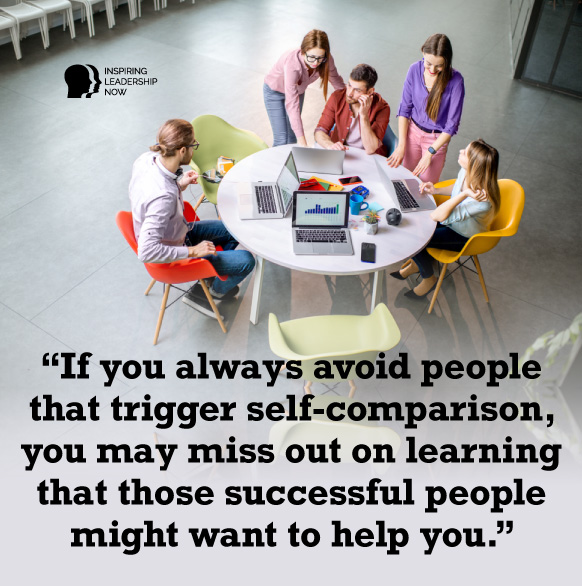Last updated: 1 September 2020

Have these unprecedented times given you an unexpected dose of career envy? Or is the old green eyes something you’re already super familiar with? Have you ever thought of a way on how to deal with career envy that won’t leave you at loss?
Either way, your career envy could be exactly what you need to leverage your career and propel you towards business success.
Here are 7 proven techniques on how to deal with career envy to make career envy your ally and harness it for professional progress.
First of all, here’s a little background for our friend’s envy.
What is Career Envy?
You might be familiar with it and it is rare for any human not to experience that feeling.
You know that burning sensation of discontent or distress you feel when you see or hear about others’ advantages, success, or possessions?
Envy knows no discrimination– it can be experienced with anything, and your career is no exception at any level.
You may be more aware of it just now because career envy increases in times of economic crisis (such as post-pandemic situations).
According to a research in Harvard Business Review’s article, this is because as the losses pile up in the crisis, “employees worry that they’re in jeopardy and grow to resent successful colleagues.”
Envy is something that affects everyone at some point. It’s so common that there are many ways in the English lexicon to describe it– the green-eyed monster, the grass always greener, green with envy, and so on.
It is such a powerful sensation that it was even made into one of the 7 deadly sins in Judeo-Christian mythology.
Who Is Affected By It?
We all want what someone else has at some time in our lives. It’s natural to look around and notice what you want to have for yourself. Essentially, this can be turned into an inspiration.
However, when inspiration goes sour, tips into resentment and turns into envy, it can get the best of you. In these digitally powered times, perhaps all the more so, says the School of Life article On Envy.
What’s the reason behind this?
In the digital age, like it or not, you are bombarded with images and versions of people on social media, where everyone puts their “best” versions of themselves out there.
Looking at these fake bests as facts mean it’s easy to become envious; you think you’re behind or need to be more acceptable or competitive. Especially with respect to careers!
According to the article, not only do you have the spread of images and stories of people besting themselves (and others) at every opportunity, you also have a myth of “intense equality.”

This is effectively a wholesale belief in the American dream– where anyone can do anything, you just have to work hard enough.
This myth, they say, is “torture” in terms of envy– because for envy to really take ahold you have to believe that others’ advantages are within reach.
And because the American dream teaches us that everything is within reach, “the opportunities for envy grow dangerously large.”
How To Deal With Career Envy And How It Affects Your Performance
In its grip, envy can literally feel like it is eating you up from the inside.
It can be so consuming that it can take you from being a top performer to a top a-hole.
In the HBR article Envy At Work, Tanya Menon and Leigh Thompson describe the envious rivalry between two co-workers. One of the workers completely jeopardized his productivity and sabotaged his own advancement as a result of his un-managed envy.
This guy was initially the top performer of the two. Yet he became so fixated on the recognition and opportunities his colleague won with his personality and networking skills that his resentment boiled over into all-out envy.
He snubbed and undermined his co-worker in meetings and interactions.
He started to distance himself from the organization and from other teammates, included those he had previously mentored.
His performance deteriorated and left him vengeful, passion-less, and stuck.
And the other guy…? He went on to advance in his career.
Un-managed envy jeopardizes your opportunities.
It stops you from learning by making you distant and disparaging. It also makes for a negative and toxic environment.
It turns you into not such a nice friend or colleague and makes you into your own worst enemy.
The great news is that all of this can be turned around, and used to leverage your career. You can use your envy to gain the success you crave.
Now the question is, how?
How To Deal With Career Envy And Harness It For Business Success
1. Use Your Envy As A Call To Action
Envy doesn’t have to be destructive. In fact, you can use it as a signal. Whatever you’re envious about, is meant for you.
Tanya Menon and Leigh Thompson advise treating the envy reflex as a source of information.
To leverage it, pay attention to what it is that you want and turn it into a goal of yours.
According to the School of Life, “there is a portrait of a ‘true self’ waiting to be assembled when we flick through a magazine, turn the pages of a newspaper or hear updates […] about the career moves of old schoolmates.”
So notice what makes you envious.
Own it. Identify what it is you want, and focus on making that your reality (not at the expense of someone else’s!).

2.You Do You
Comparisons can be motivational for some.
However, excessive comparison is a breeding ground for envy building.
Instead of looking for outside comparisons, Menon and Thompson suggested that you switch it around– take your focus off the other, and onto you.
Compare you to you (and don’t be ungenerous).
For example, look at the ways that you have contributed to your company and your solid achievements. This will make you feel more self-confident and take your resentment off the other.
Feeling confident in your own abilities not only takes your focus off resentment, but it also makes you more receptive to ideas and therefore more productive.
This is a proven fact. In an experiment conducted by Menon and Thompson, they asked a group of people to think about a rival and prepare for a task in which they would evaluate that rival’s latest idea.
Before the task, half the participants listed several accomplishments (such as “I’m a good tennis player”) or cherished values (“I put my family first”).
The other half did not.
This simple exercise demonstrated profound results.
When the participants were asked what percentage of their working day they’d be willing to dedicate to learning about their rival’s plan, they found that managers who had affirmed themselves beforehand were willing to allocate about 60% more time to review their rivals than those who had not been through the affirmation process.
If that were translated into 10 minutes more a day, and multiplied by 20people in a department over the course of a year, they concluded that the impact could be huge.
Because there’s a whole, untapped, reserve of research and inspiration right there!
3. Shift To Curiosity
Interpreting someone else’s success as a sign of your inferiority is self-limiting.
Instead, says Nihar Chhaya in his article, The Upside of Career Envy, you can make a shift from self-analysis to outward curiosity.
If you get curious about why others’ experiences seem more important than your own, you will notice that it is because their stories reflect some of your values and interests.
So shift the curiosity onto you and look at how you work and how you might incorporate some of the other’s elements into your own career or life.
Take what the other person’s journey can teach you about your chosen path.
Chhaya uses himself as an example when he started feeling envious at the corporate and diplomatic successes of his fellow college grads.
He looked at his work as an executive coach. Using his curiosity in favor of self-analysis, he looked at how he might bring his coaching skills to their world of media, diplomacy, and venture capital.
Doing this, rather than being stuck and fixated on comparisons (between self or other), he re-empowered himself to feel excited about his future career.
He also opened up opportunities to advance his career in new and inspiring ways.
4. Make Allegiance With Your Objects Of Envy
Making allies with the people you envy seems counterintuitive to the envious reflex.
However, it will prove to be very beneficial to your career, says Chhaya.
Initially, it might be challenging to be happy for someone you envy, because in your mind it can emphasize that they are superior to you.
And the typical (envious) way to handle that is to either be disparaging towards them or to create distance from them (or both). Neither of these things builds rapport or positive relationships.
By turning towards your object of envy, having worked through the steps above, you can shift your perspective from threat to goal.
And this will be a benefit to your career. Chhaya writes:
“If you always avoid people that trigger self-comparison, you may miss out on learning that those successful people might want to help you.”

5. Share Power
As a leader, manager, or entrepreneur, it is likely that you might find yourself the object of other’s envy, or that you are called to deal with envy directed at your top people.
Rather than controlling it by denying yourself or your team the promotions and rewards for good performance, there are steps you can take to help circumvent and how to deal with career envy.
Sharing power is one of these steps.
Menon and Thompson report that they studied one Unilever senior executive who consistently rewards her successful subordinates with the credit and responsibility they’d earned.
She built a reputation for advancing exceptionally motivated future leaders, creating a strong network of allegiances in the process.
As a result, she was promoted because by sharing credit and responsibilities she built up others in a positive and empowered way.
6. Create Separate Spheres Of Influence
Creating separate spheres of influence for envious coworkers is a sure-fire way of curbing resentful comparisons from building up.
Set yourself, or your teammates up in separate domains, and give space to mentally carve out distinct areas of specialization.
For example, construct situations where direct comparisons will not be made between the two rival parties.
Perhaps orienting one of you towards a mentoring role, or drawing on a different aspect of your skill sets in day-to-day roles.
Using different metrics to evaluate work performance means that the work is less comparable.
As a result, it opens up space for the two potential rivals to learn from each other and develop their (or your) rapport.
Ultimately, remember that if it feels important, indeed it is important.
Your job is not your identity. “When you identify your self-worth by your job, you are setting up yourself for disappointment anytime you see someone surpassing you.”
Chhaya has a top tip on this point– try defining your career as a “diverse portfolio of time and talent investments.”
By separating your identity from your primary work-role you have options to diversify and develop other aspects of your unique skill set.
Take a side hustle for example, like blog writing or vlogging.
Assuming there is no conflict of interest and your organization is down with it, you can create more of your uniqueness through this side channel.
You get to add value to your portfolio.
You get to bring more of your value to the world: “You can hedge against the painful moments of feeling behind in some areas, with activities where you build a lead.”
7. Choose Plenty Over Scarcity
Competing for resources adds to the potential for envy levels to ramp up.
In a study detailed in the HBR, researchers noticed that when airtime with management was seemingly scarce, it produced a competitive one-upmanship dynamic in meetings.
Colleagues battled to win time with their manager.
The group meeting times with the manager were fixed, yet his other time was flexible.
So, he made himself more available outside of meetings to connect with his subordinates.
By doing so this manager took the time-scarcity out of the equation and made one-to-one contact time plentiful, guaranteeing each team member an hour of contact time per week.
The result? More collaborative meetings and better rapport between colleagues.
By hoarding resources as an attempt to guarantee your survival, you actually isolate yourself, lose important allies, and jeopardize your chances of success.
However, Menon and Thompson say that “sharing resources, in contrast, lays the groundwork for reciprocity and future collaboration.”

“Always be a first-rate version of yourself, instead of a second rate version of somebody else.”
– Judy Garland
When envy strikes, rather than dodge it and create a distance, turn towards it and ask yourself “what can I learn from this?”
By noticing what envy has to say, valuing what you can to bring to the table, and with the help of these 7 techniques, you can hack your way on how to deal with career envy and leverage your career.
Transform career envy as an inspiration and tool towards the success you desire, and possibly become the envy of others.


